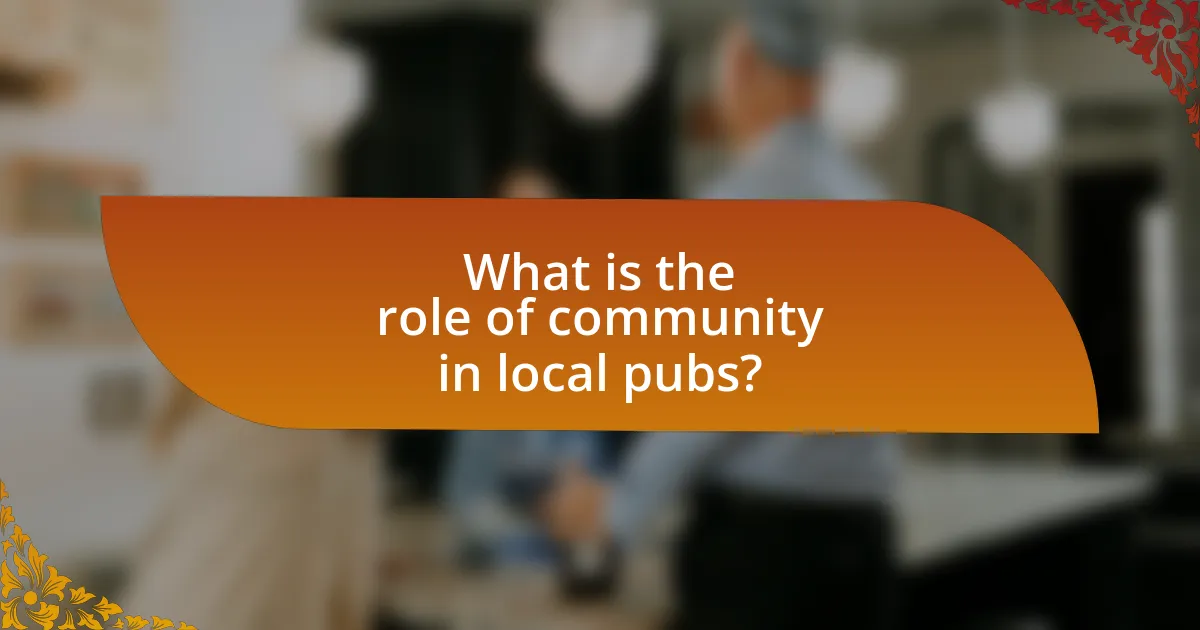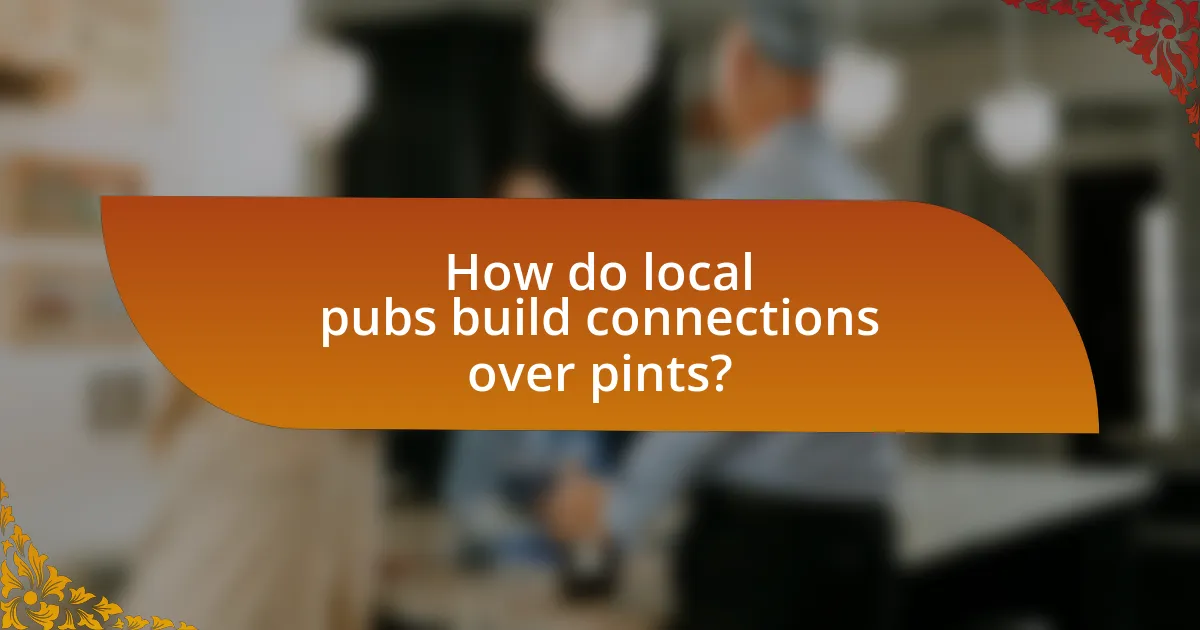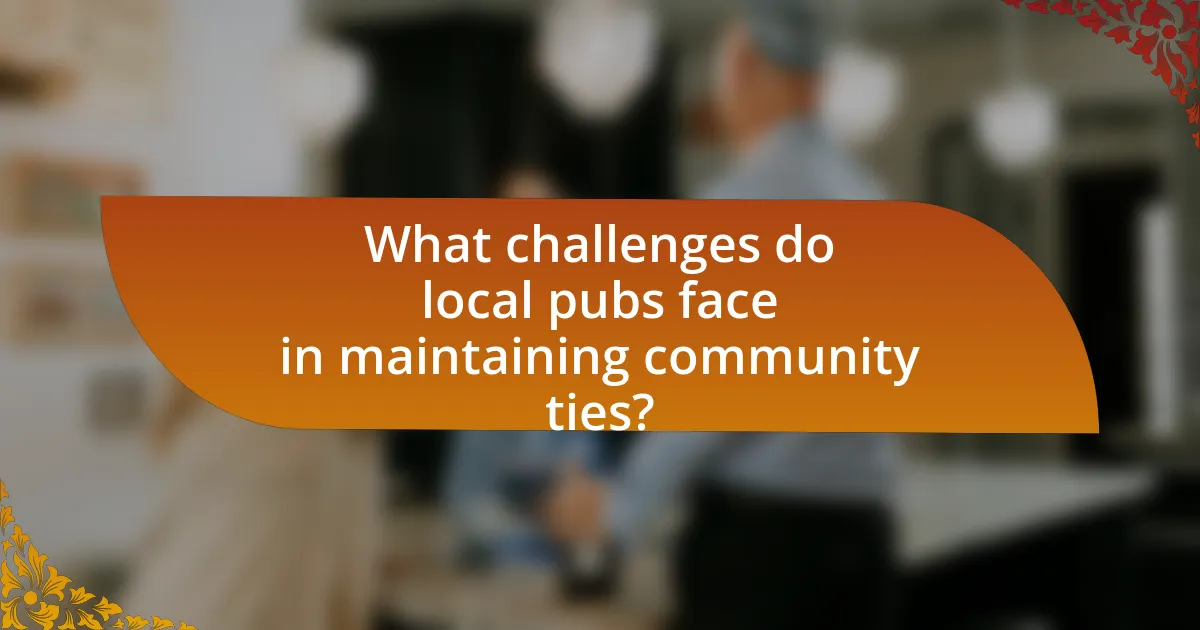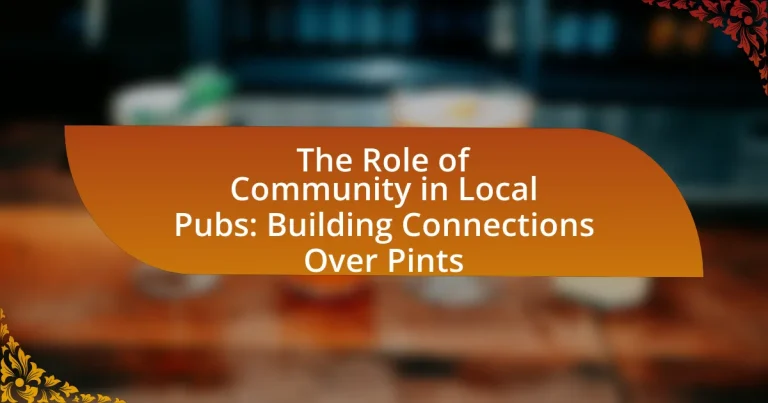The article examines the significant role of community in local pubs, highlighting how these establishments serve as vital social hubs that foster connections and a sense of belonging among patrons. It discusses various aspects, including the social dynamics present in pubs, the events they host to promote community interaction, and their support for local initiatives and charities. Additionally, the article addresses the challenges local pubs face in maintaining community ties, the impact of economic factors on their operations, and strategies they can implement to strengthen community engagement. Overall, it emphasizes the importance of local pubs in enhancing social cohesion and contributing to the local economy.

What is the role of community in local pubs?
The role of community in local pubs is to foster social connections and provide a sense of belonging among patrons. Local pubs serve as gathering spaces where individuals can interact, share experiences, and build relationships, contributing to the overall social fabric of the neighborhood. Research indicates that community-oriented pubs enhance social cohesion, with studies showing that regular patrons often form friendships and support networks within these establishments. This communal aspect not only enriches the lives of individuals but also strengthens the local economy by encouraging patronage and loyalty to neighborhood businesses.
How do local pubs foster a sense of belonging?
Local pubs foster a sense of belonging by serving as communal spaces where individuals can gather, socialize, and form connections. These establishments often host events such as trivia nights, live music, and community gatherings, which encourage interaction among patrons and create a shared experience. Research indicates that regular visits to local pubs can enhance social networks and contribute to a feeling of community, as evidenced by a study published in the Journal of Community Psychology, which found that social interactions in local venues significantly improve residents’ sense of belonging and community attachment.
What social dynamics are present in local pubs?
Local pubs exhibit several social dynamics, including community bonding, social stratification, and informal social networks. Community bonding occurs as patrons gather regularly, fostering relationships and a sense of belonging. Social stratification is evident as different groups, such as locals and newcomers, interact, often leading to the establishment of hierarchies based on familiarity and social status. Informal social networks develop as individuals share experiences and information, enhancing social cohesion. These dynamics are supported by studies indicating that local pubs serve as vital social hubs, promoting interaction and community engagement, which is essential for social well-being.
How do local pubs serve as community hubs?
Local pubs serve as community hubs by providing a social space where residents gather, fostering connections and relationships. These establishments often host events such as trivia nights, live music, and community meetings, which encourage interaction among patrons. Research indicates that 70% of pub-goers believe that their local pub is a vital part of their community, highlighting its role in social cohesion. Additionally, local pubs frequently support local charities and initiatives, further embedding themselves in the community fabric.
Why are local pubs important for community engagement?
Local pubs are important for community engagement because they serve as social hubs that foster connections among residents. These establishments provide a space for individuals to gather, share experiences, and participate in community events, which strengthens social ties. Research indicates that local pubs contribute to community cohesion by hosting activities such as trivia nights, live music, and charity events, which encourage participation and interaction among diverse groups. According to a study by the University of Cambridge, community pubs enhance social networks and promote a sense of belonging, leading to increased civic participation and overall community well-being.
What events do local pubs host to promote community interaction?
Local pubs host various events such as trivia nights, open mic nights, and community fundraisers to promote community interaction. Trivia nights encourage teamwork and friendly competition among patrons, fostering social connections. Open mic nights provide a platform for local talent, allowing community members to showcase their skills and engage with one another. Community fundraisers often support local charities or initiatives, bringing residents together for a common cause and enhancing the sense of belonging within the neighborhood. These events not only attract customers but also strengthen community ties, making local pubs vital social hubs.
How do local pubs support local initiatives and charities?
Local pubs support local initiatives and charities by hosting fundraising events, providing sponsorships, and donating a portion of their profits. For instance, many pubs organize quiz nights, charity auctions, and live music events specifically to raise funds for local causes. Additionally, they often partner with local charities to promote awareness and encourage community involvement, which can lead to increased participation and donations. According to a 2021 survey by the British Beer and Pub Association, 80% of pubs engage in charitable activities, demonstrating their commitment to supporting local communities.

How do local pubs build connections over pints?
Local pubs build connections over pints by fostering a communal atmosphere where patrons can socialize and engage with one another. This environment encourages regular interactions, creating a sense of belonging among customers. Research indicates that 70% of pub-goers visit their local establishments to connect with friends and meet new people, highlighting the social role these venues play in community building. Additionally, events such as trivia nights, live music, and themed gatherings further enhance social bonds, making local pubs essential hubs for community interaction.
What role does alcohol play in social bonding at pubs?
Alcohol serves as a social lubricant that facilitates bonding among individuals at pubs. It lowers inhibitions, encourages conversation, and fosters a sense of camaraderie, making it easier for people to connect. Research indicates that shared drinking experiences can enhance feelings of belonging and community, as evidenced by a study published in the Journal of Social and Personal Relationships, which found that alcohol consumption in social settings significantly increases interpersonal trust and bonding. This effect is particularly pronounced in environments like pubs, where the atmosphere is designed for social interaction, further reinforcing the role of alcohol in creating and strengthening social ties.
How does shared drinking culture enhance relationships?
Shared drinking culture enhances relationships by fostering social bonds and creating a sense of community among individuals. Engaging in communal drinking experiences, such as at local pubs, encourages interaction and conversation, which can lead to deeper connections. Research indicates that shared activities, including drinking, promote feelings of belonging and trust, essential components for strong relationships. For example, a study published in the Journal of Community Psychology found that social gatherings centered around drinking can significantly increase social cohesion and support networks within communities.
What are the psychological effects of social drinking in pubs?
Social drinking in pubs can lead to enhanced feelings of social connection and reduced feelings of loneliness. Engaging in communal drinking fosters a sense of belonging, as individuals often share experiences and build relationships in these social settings. Research indicates that social interactions in pubs can trigger the release of oxytocin, a hormone associated with bonding and trust, which further reinforces social ties. Additionally, studies have shown that moderate social drinking can improve mood and increase feelings of happiness, as evidenced by a survey conducted by the National Institute on Alcohol Abuse and Alcoholism, which found that social environments positively influence emotional well-being.
How do local pubs cater to diverse community needs?
Local pubs cater to diverse community needs by offering inclusive environments, varied menus, and hosting events that reflect the interests of different demographic groups. These establishments often provide accessible spaces for social interaction, allowing individuals from various backgrounds to connect. For example, many pubs feature menus that accommodate dietary restrictions, such as vegetarian, vegan, and gluten-free options, ensuring that all patrons can enjoy their offerings. Additionally, local pubs frequently organize community events, such as quiz nights, live music, and cultural celebrations, which foster engagement and participation among diverse community members. This approach not only enhances social cohesion but also supports local culture and economy, as evidenced by studies showing that community-focused pubs contribute significantly to local social networks and economic vitality.
What types of clientele do local pubs attract?
Local pubs attract a diverse clientele, including regular patrons, families, young adults, and tourists. Regular patrons often seek a familiar social environment, while families may visit for meals and community events. Young adults typically enjoy the social atmosphere and nightlife, and tourists often seek local culture and experiences. According to a study by the British Beer and Pub Association, 70% of pub-goers visit for social interaction, highlighting the community aspect that local pubs foster.
How do local pubs adapt to changing community demographics?
Local pubs adapt to changing community demographics by diversifying their offerings and creating inclusive environments. For instance, they may introduce varied menus that cater to different dietary preferences, such as vegetarian, vegan, or gluten-free options, reflecting the dietary trends of the community. Additionally, local pubs often host events that appeal to a broader audience, such as trivia nights, live music, or cultural celebrations, which can attract diverse groups and foster community engagement. According to a study by the British Beer and Pub Association, pubs that actively engage with their local communities see a 20% increase in patronage, demonstrating the effectiveness of these adaptive strategies.

What challenges do local pubs face in maintaining community ties?
Local pubs face several challenges in maintaining community ties, primarily due to competition from larger establishments and changing social habits. The rise of chain bars and restaurants often draws patrons away from local pubs, diminishing their unique community atmosphere. Additionally, the increasing popularity of home entertainment options, such as streaming services, reduces the frequency of social outings, impacting local pubs’ customer base. According to a report by the Campaign for Real Ale (CAMRA), over 16,000 pubs in the UK have closed since 2000, highlighting the struggle of local pubs to retain their community relevance. These factors collectively hinder local pubs from fostering strong community connections.
How do economic factors impact local pubs and their communities?
Economic factors significantly impact local pubs and their communities by influencing their financial viability and social role. For instance, fluctuations in disposable income affect consumer spending on leisure activities, including pub visits; during economic downturns, reduced spending can lead to decreased patronage, threatening the survival of local pubs. Additionally, changes in taxation, such as increased alcohol duties, can raise prices, further discouraging customers. According to a report by the British Beer and Pub Association, pubs contribute £23 billion to the UK economy and support over 900,000 jobs, highlighting their importance not only as social hubs but also as economic contributors. Thus, economic conditions directly shape the operational capacity of local pubs and their ability to foster community connections.
What are the effects of rising costs on local pub operations?
Rising costs significantly impact local pub operations by increasing overhead expenses, which can lead to reduced profit margins. As costs for ingredients, utilities, and labor rise, pubs may be forced to increase prices for customers, potentially driving away patrons. According to a survey by the British Beer and Pub Association, 70% of pubs reported that rising costs have led to menu price increases, which can deter regular customers and affect community engagement. Additionally, higher operational costs may limit a pub’s ability to invest in community events or improvements, further diminishing its role as a local gathering place.
How do local pubs compete with larger chains and bars?
Local pubs compete with larger chains and bars by emphasizing their unique community connections and personalized service. These establishments often foster a sense of belonging by hosting local events, supporting nearby businesses, and creating a welcoming atmosphere that larger chains cannot replicate. For instance, a study by the Campaign for Real Ale (CAMRA) found that 80% of customers prefer local pubs for their community feel and personal interactions, highlighting the importance of local identity in attracting patrons. Additionally, local pubs frequently offer unique, locally sourced products, which appeal to consumers seeking authenticity and quality over mass-produced options.
What strategies can local pubs implement to strengthen community connections?
Local pubs can strengthen community connections by hosting regular events that encourage social interaction, such as trivia nights, live music, and community fundraisers. These events create a welcoming atmosphere where residents can gather, fostering relationships and a sense of belonging. Research indicates that community engagement activities in local establishments can increase patron loyalty and enhance social cohesion, as seen in studies by the American Journal of Community Psychology, which highlight the positive impact of social venues on community ties. By actively involving themselves in local issues and supporting neighborhood initiatives, pubs can further solidify their role as community hubs.
How can local pubs enhance their community engagement efforts?
Local pubs can enhance their community engagement efforts by hosting regular events that cater to diverse interests, such as trivia nights, live music, and community fundraisers. These activities foster social interaction and create a sense of belonging among patrons. For instance, a study by the University of Cambridge found that community-focused events in local establishments significantly increase social cohesion and local participation. By collaborating with local charities and organizations, pubs can also support community initiatives, further solidifying their role as a community hub.
What best practices can local pubs adopt to remain relevant?
Local pubs can remain relevant by fostering community engagement through events, partnerships, and unique offerings. Hosting regular events such as trivia nights, live music, or themed parties encourages local patronage and builds a sense of community. Collaborating with local businesses for cross-promotions or sourcing ingredients from nearby farms enhances local ties and supports the economy. Additionally, offering a diverse menu that includes craft beers, local wines, and unique food options caters to evolving consumer preferences. According to a study by the British Beer and Pub Association, pubs that actively engage with their communities see a 20% increase in customer loyalty, demonstrating the effectiveness of these practices.


